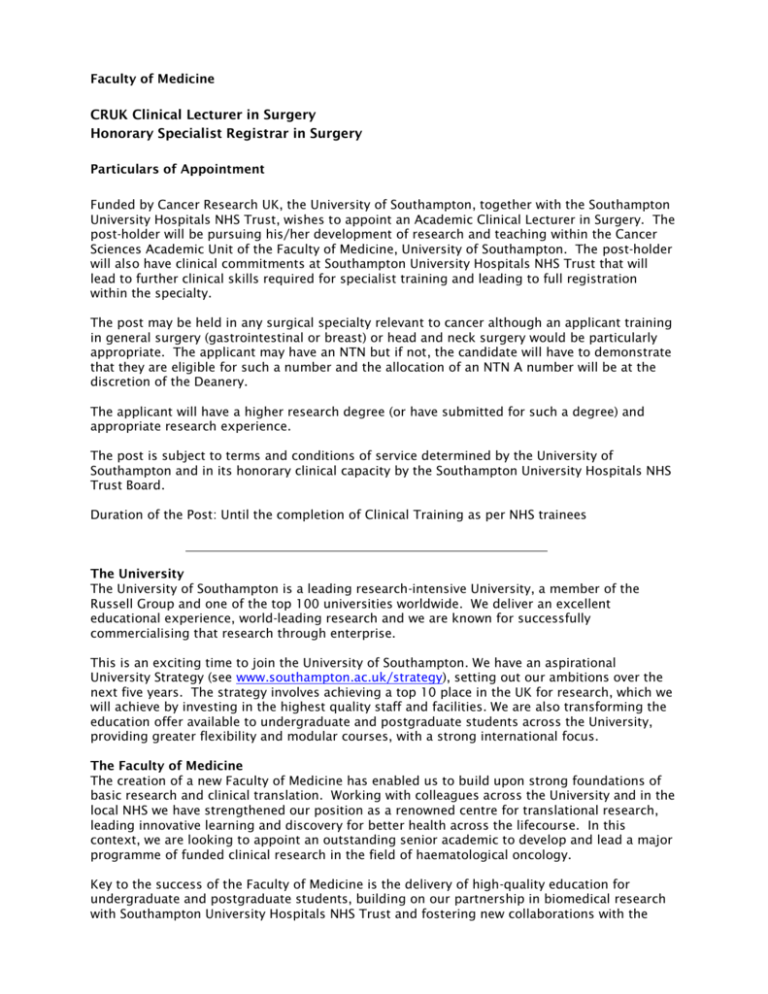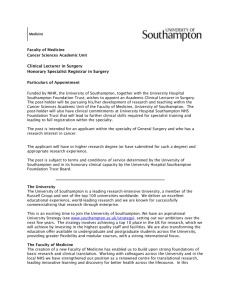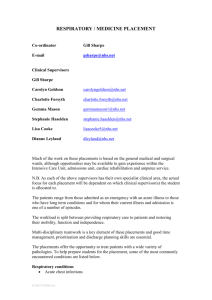Further Particulars Clinical Lecturer in Surgery
advertisement

Faculty of Medicine CRUK Clinical Lecturer in Surgery Honorary Specialist Registrar in Surgery Particulars of Appointment Funded by Cancer Research UK, the University of Southampton, together with the Southampton University Hospitals NHS Trust, wishes to appoint an Academic Clinical Lecturer in Surgery. The post-holder will be pursuing his/her development of research and teaching within the Cancer Sciences Academic Unit of the Faculty of Medicine, University of Southampton. The post-holder will also have clinical commitments at Southampton University Hospitals NHS Trust that will lead to further clinical skills required for specialist training and leading to full registration within the specialty. The post may be held in any surgical specialty relevant to cancer although an applicant training in general surgery (gastrointestinal or breast) or head and neck surgery would be particularly appropriate. The applicant may have an NTN but if not, the candidate will have to demonstrate that they are eligible for such a number and the allocation of an NTN A number will be at the discretion of the Deanery. The applicant will have a higher research degree (or have submitted for such a degree) and appropriate research experience. The post is subject to terms and conditions of service determined by the University of Southampton and in its honorary clinical capacity by the Southampton University Hospitals NHS Trust Board. Duration of the Post: Until the completion of Clinical Training as per NHS trainees The University The University of Southampton is a leading research-intensive University, a member of the Russell Group and one of the top 100 universities worldwide. We deliver an excellent educational experience, world-leading research and we are known for successfully commercialising that research through enterprise. This is an exciting time to join the University of Southampton. We have an aspirational University Strategy (see www.southampton.ac.uk/strategy), setting out our ambitions over the next five years. The strategy involves achieving a top 10 place in the UK for research, which we will achieve by investing in the highest quality staff and facilities. We are also transforming the education offer available to undergraduate and postgraduate students across the University, providing greater flexibility and modular courses, with a strong international focus. The Faculty of Medicine The creation of a new Faculty of Medicine has enabled us to build upon strong foundations of basic research and clinical translation. Working with colleagues across the University and in the local NHS we have strengthened our position as a renowned centre for translational research, leading innovative learning and discovery for better health across the lifecourse. In this context, we are looking to appoint an outstanding senior academic to develop and lead a major programme of funded clinical research in the field of haematological oncology. Key to the success of the Faculty of Medicine is the delivery of high-quality education for undergraduate and postgraduate students, building on our partnership in biomedical research with Southampton University Hospitals NHS Trust and fostering new collaborations with the physical sciences, including chemistry, engineering and computing. The new senior academic in Haematological Oncology will play a key role in these developments. Medical Education We offer a range of undergraduate programmes: the BM4 programme, a graduate-entry fouryear programme which accepts 40 students per year; and the BM5and BMedSc programme which accepts 200 students per year including approximately 30 students from a BM6 programme aimed at widening access to a medical career. Science teaching in the first three years of the BM programmes is delivered in the South Block of Southampton General Hospital as well as the Life Sciences Building on Highfield Campus. Clinical teaching takes place at Southampton General Hospital and the adjoining Princess Anne Hospital, the Royal South Hants Hospital, and in NHS Trusts and General Practices throughout Hampshire, Dorset, West Sussex and Salisbury. The BM5 programme has a number of distinctive features. These include the integrated nature of teaching where the scientific disciplines are taught together in a clinical context using a systems based approach and the BMedSc programme, an eight month supervised research project undertaken in Year 4. There is also the opportunity, for selected students, to undertake an integrated, intercalated Masters in Medical Science (MMedSc). The BM4 programme also has a number of key features. These include clinical topics in the first two years where students meet on a regular basis in Graduate Groups, and learning with BM5 students in the third and fourth years on all clinical attachments. All students take the same intermediate and final examinations. All programmes have substantial clinical experience in the first two years, student selected components, dispersed final year attachments, work shadowing prior to commencing a Foundation post and inter-professional learning. In addition to the undergraduate BM programmes the School provides two Masters Degree programmes in Public Health Nutrition and Allergy. Research The Faculty of Medicine has a clear research strategy to investigate the biomedical basis of common human diseases and to translate this into clinical practice. The Faculty’s research is delivered through four Academic Units: Cancer Sciences Human Development and Health Infection, Inflammation and Immunity Primary Care and Population Sciences All research is organised and managed by these Academic Units, each of which has clear evidence of international excellence. Each carries a significant degree of devolved responsibility for its research budgets and grants, space, equipment and personnel. Working in close partnership with Southampton University Hospitals NHS Trust, translational research is delivered through the Southampton Centre for Biomedical Research, bringing together the Wellcome Trust Clinical Research Facility, the Clinical Trials Unit, two NIHR Biomedical Research Units (Respiratory, and Nutrition Lifestyle), shadow Biomedical Research Units in Cardiovascular, and Bone and Joint Disease, and the Cancer Research UK, Experimental Cancer Medicine Centre. The Cancer Research UK Centre The Cancer Research UK Centre brings together established programmes of laboratory and clinical research, particularly in the areas of immunology and immunotherapy; the biology and treatment of lymphoma, urologic and breast cancer, and cancer genetics. It is also building strength in Surgical Oncology, particularly developing surgical research in colorectal, upper GI, 2 breast and head and neck cancers. It has a record of excellence in training clinical and nonclinical postgraduates, and a successful 4 year PhD programme. There is close integration between the CR UK Centre, the University School of Medicine, Cancer Sciences Division and the NHS Southampton Cancer Centre. Important components of the Centre include: Mature Programmes of basic and applied immunology: o Prof Tim Elliott: Mechanisms of antigen processing o Prof Freda Stevenson: Genetic Vaccines for Cancer o Prof Christian Ottensmeier: Translational Immunotherapy o Prof Martin Glennie: Therapeutic antibody development Active programmes of research in the molecular mechanisms of cancer: o Prof Graham Packham: Apoptosis, biology of CLL o Dr Jeremy Blaydes: Cell Stress-response group A strong Oncology team of senior clinical academics: o Prof Peter Johnson: Lymphoma o Prof Christian Ottensmeier: Melanoma, Lung Cancer o Dr Andrew Bateman: GI Cancer o Dr Andrew Davies: Lymphoma o Dr Simon Crabb, Urologic Cancer A rapidly-expanding academic Department of Surgery: o Prof John Primrose: Upper GI cancer trials o Mr Alex Mirnezami (CR UK Clinician Scientist): Colorectal cancer biology o Mr Ramsey Cutress: Breast Cancer biology o Mr Tim Underwood: (MRC Clinician Scientist ) o Ms Emma King: Biology of Head and Neck Cancer A developing programme in academic Cancer Pathology: o Prof Gareth Thomas: Head and Neck Cancer and Upper GI Cancer biology A strong Cancer Genetics Department o Prof Diana Eccles: Breast Cancer predisposition and management. o Prof Anneke Lucassen: Familial Cancer database o There are close links to the Wessex Regional Genetics Laboratory with the clinical genetics team all holding joint appointments. The Centre hosts the Central South Coast Cancer Research Network of the NCRN (Clinical Lead, Dr Andrew Bateman) for a population of 2 million, which currently recruits 13% of incident cancer cases (approximately 1300 patients) into clinical trials (2008/9). There is close integration of the Network and the CR UK Clinical Research Unit which conducts early phase studies, with research nurses from the two teams cross-covering clinics and unified professional leadership through the CR UK Senior Research Nurse (Jac Samuel). The Southampton Clinical Trials Unit (Director: Professor Diana Eccles), has core funding from CR UK and HTA. Since it was established in 2006 this has expanded its activity to include studies in Upper GI and Colorectal cancer, Lymphoma, Breast and Prostate cancer. The Unit benefits from the long-standing excellence in Clinical IT systems developed in the centre and is piloting remote data capture in the academic UK clinical trials arena. 3 The Southampton Experimental Cancer Medicine Centre (Lead: Prof Christian Ottensmeier), with an expanding portfolio of early phase trials, many testing reagents developed in the Southampton laboratories, and carrying out complex immunologic endpoint assays to GCLP. Located on the Southampton General Hospital campus, which includes the facilities of the Southampton Oncology Centre (Radiation Oncology, Medical Oncology and Clinical Haematology including level 4 transplantation) as well as the full range of general and tertiary specialist medical facilities, including neurosurgery, hepatobiliary and pancreatic surgery, cardiothoracic surgery, paediatric oncology, cellular pathology and molecular diagnostics. A dedicated and fully-staffed Wellcome Trust Clinical Research Facility is also located in the hospital immediately adjacent to the Medical Oncology ward, for the conduct of early phase clinical trials work. Details of the post Department Post Grade Responsible to Surgery Clinical Group Lecturer in Surgery Honorary Specialist Registrar Professor JN Primrose, Professor of Surgery Clinical Duties Southampton University Hospitals NHS Trust is a large teaching hospital which provides all surgical specialties with the exception of Plastic Surgery and Transplantation. The general surgical service at Southampton is highly specialised and divided into Upper GI (Oesophagogastric and HPB), Colorectal, Breast and Vascular services. The post may be held in any surgical specialty relevant to cancer. The Lecturer will be attached to the appropriate clinical firm. Duties include operating, OP clinics and emergency takes. The Lecturers on-call will be the same as the other SpRs. The elective clinical component and the University related component of the job will be approximately equal. Commonly the Lecturer will work in Southampton but a period of time in another centre in Wessex may be arranged if clinically appropriate or if it benefits the research programme. Current Academic Surgical Staff Professor JN Primrose, Professor of Surgery Professor CP Shearman, Professor of Vascular Surgery Mr C Johnson, Reader in Surgery Mr R Cutress, CRUK Senior Lecturer in Breast Surgery Ms E King, CRUK Senior Lecturer in Head and Neck Surgery Ms KP Nugent, Senior Lecturer in Surgery Mr A Mirnezami, CRUK Clinician Scientist and Senior Lecturer Mr T Underwood, MRC Clinician Scientist Mr J Hopkins, Lecturer in Surgery Training, Research and Teaching Duties The lecturer will undertake surgical training in an appropriate sub-specialist area. The training programme will be agreed with the STC in Surgery and with the trainers in SUHT and elsewhere. Most training will be undertaken in Southampton but rotation to appropriate units in Wessex and on occasions elsewhere will be offered. Emergency duties will be the same as other SpRs on the rota. At the discretion of the STC CCT will be achieved when the appropriate competencies are met. The Lecturer will join other lead staff in surgery in the provision of undergraduate and postgraduate education in the specialty. Undergraduate education in surgery is provided principally in the 3rd and 5th years. In addition Surgery has a strong tradition 4 in providing projects for the 4th year study in depth. The Lecturer will be a member of an appropriate research division. It is anticipated that a research programme will be developed that will lead to substantive grant income and ultimately lead to the individual being competitive for a Clinician Scientist award. Management duties Southampton General Hospital established a clinical management system. All staff in each Directorate are managerially accountable to the Divisional Clinical Director who has overall responsibility for the services within the Directorate. The surgical directorate has Lead Consultants within each sub-specialty who also act as liaison between individual consultant teams and the Divisional Clinical Director. Administrative duties The post-holder will be required to: 1. undertake the administrative duties associated with the care of patients. 2. travel as necessary between units Secretarial support and office accommodation will be provided in the Academic Surgical Unit. The research infrastructure will be provided by the appropriate research division. General provisions: Subject to the provisions of the Terms and Conditions of Service, the post-holder will be expected to observe the Trust’s agreed policies and procedures, drawn up in consultation with the profession on clinical matters, and to follow the standing orders and financial instructions of the Trust. In particular, where the post-holder manages employees of the Trust, he/she will be expected to follow the local and national employment and personnel policies and procedures. The postholder will be expected to make sure that there are adequate arrangements for hospital staff involved in the care of his/her patients and to be able to contact him/her when necessary. All medical and dental staff employed by the Trust are expected to comply with its Health and Safety Policy and Procedures. The post-holder will be responsible for the training and supervision of junior medical staff who work with him/her and will devote time to this activity on a regular basis. If appropriate, the post-holder will be named in the contracts of doctors in training grades as the person responsible for overseeing their training and as the initial source of advice to such doctors on their careers. Work programme The work programme will depend in the appointee’s clinical training and research programme. He/she will devote approximately 50% of time to University activities. Review This job description will be reviewed each year by the post-holder and Professor JN Primrose and the appropriated Research Division Director. Local procedures will be followed in the event of any disagreement over proposed changes culminating an appeal to a sub- committee of the University of Southampton. Residence Residence within either 10 miles of or thirty minutes by road from Southampton General Hospital is a requirement of this post unless specific approval for alternative arrangements is given by the Trusts. Visiting Candidates are encouraged to visit and should contact: Professor JN Primrose, (Professor of Surgery). 5 TERMS OF APPOINTMENT 1. The appointment will be governed by the general conditions applicable to Clinical Lecturers in the University of Southampton; details of these are available on request and will be sent to candidates called for interview. The appointee will be subject to the relevant terms of appointment as determined by the appropriate NHS Trust, in connection with his/her clinical duties, in so far as they may apply to clinical academic staff holding honorary NHS Trust contracts. The appointee will be responsible to the Head of the School of Medicine through the Divisional Director/Head of the University Clinical Group for the satisfactory conduct of his/her duties. 2. The successful candidate will be expected to take up their appointment as soon as possible. 3. The appointment will be made within the Clinical Lecturer’s salary scale, depending on qualifications and experience. 4. The appointment may be terminated by a term’s notice on either side. 5. In addition to your substantive contract of employment with the University, you will also hold an honorary NHS contract with an NHS Trust and are required to be registered with the General Medical Council. This honorary contract and registration is essential for the proper performance by you of the duties of your employment with the University. In the event that the honorary contract is terminated or the registration is revoked or suspended, your continued employment with the University under this contract will need to be reviewed and may be terminated. The procedure for considering whether to terminate your substantive contract of employment with the University in such circumstances is set out in the University’s Statutes and Ordinances from time to time in force and in a protocol between the University and the NHS Trust. You will be required during your tenure of office to undertake appropriate clinical work on an honorary basis under the National Health Service. No professional contact with National Health Service patients may be undertaken unless a duly authorised honorary contract has been issued to you and is currently valid. 6. The appointee will be subject to assessment via the normal processes in place for SpR grade staff addition to appraisal with a University line manager. 7. The person appointed will be required to observe the Charter, Statutes and Ordinances of the University and to carry out all orders and regulations of the Council. It should be noted that these regulations include a policy of no smoking at work which, with the exception of certain designated areas, prohibits smoking in most University buildings. 8. The person appointed will be expected to work within the spirit and letter of the University's Equal Opportunities Policy: "The University of Southampton confirms its commitment to a comprehensive policy of equal opportunities in employment and for students in which individuals are selected and treated on the basis of their relevant merits and abilities and are given equal opportunities within the University. The aim of the policy is to ensure that no job applicant or employee, prospective student or student, should receive less favourable treatment on any grounds which are not relevant to good employment practice for staff or to academic ability and attainment for students. The University is committed to a programme of action to make the policy fully effective." 9. Applications will not be acknowledged. 6 10. Because of the nature of the work for which you are applying, this post is exempt from the provisions of Section 4(2) of the Rehabilitation of Offenders Act 1974 by virtue of the Rehabilitation of Offenders Act 1974 (Exceptions) Order 1975. Applicants are, therefore, not entitled to withhold information about convictions and, in the event of employment, any failure to disclose such convictions could result in dismissal or disciplinary action by the University. The University will routinely conduct checks on criminal records for all those appointed to posts that have contact with children or vulnerable adults. Any information given will be completely confidential and will be considered only in relation to an application for positions to which the order is applied. 11. Applicants should send a full curriculum vitae (5 copies from UK applicants, 1 from overseas), including the names and addresses of three referees to the Human Resources Department (M), University of Southampton, Highfield, Southampton SO17 1BJ. 7








